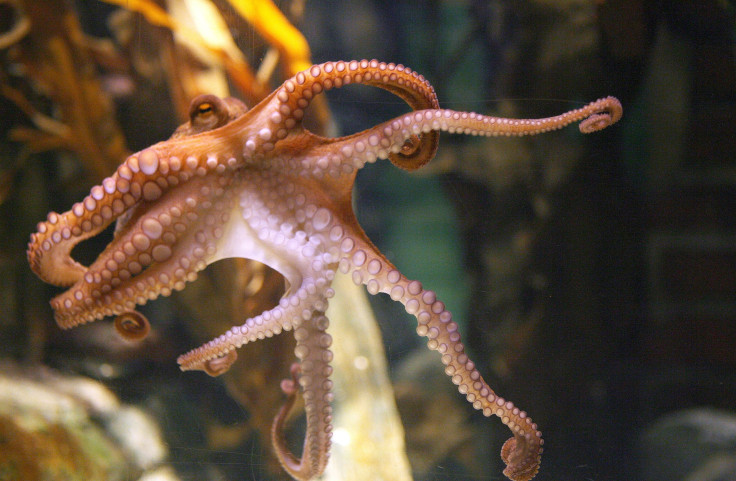Octopuses, Squids And Cuttlefish Retain Ability To Defy Genetic Instructions, Edit Genes On The Fly

As any marine biologist would confirm, octopuses and squids — creatures that belong to a subclass of cephalopods known as coeloids — are incredibly intelligent. The behavioral complexity these creatures exhibit is unparalleled in the invertebrate world, and this is what makes studying the evolutionary path to their neural sophistication of such vital interest to scientists.
A new study published Thursday in the journal Cell has revealed something surprising — octopuses and their kin make extensive use of RNA editing at the expense of evolution of their genomic DNA. In the squid brain, for instance, over 60 percent of RNA transcripts are recoded by editing, compared to less than 1 percent in humans.
“Evolutionarily, that’s a big deal,” Jin Billy Li, an assistant professor of genetics at Stanford University who was not involved in the study, told the New York Times.
DNA, or deoxyribonucleic acid, is the molecule that carries hereditary information, including instructions that code for proteins, in almost all organisms on this planet. RNA, short for ribonucleic acid, on the other hand, serves two functions — that of a messenger, faithfully copying the information contained in the DNA (a process known as transcription), and a manufacturer of protein (a process called translation).
In most living beings, changing the message that is read out to make proteins is achieved only by changing the underlying DNA code. However, there is another way to alter the nature of proteins an organism produces — one that does not require it to change the DNA instructions. This process, called RNA editing, is an extremely rare exception in most animal groups, but among coeloid cephalopods, this seems to be widespread.
“Basically, this is a mechanism to make proteins that are not encoded in the DNA. They are not present in the genomic sequence,” Eli Eisenberg, a biophysicist at Tel Aviv University in Israel, and co-author of a study detailing the findings, told Cell Press. “With these cephalopods, this is not the exception. This is the rule. The rule is that most of the proteins are being edited.”
According to the study, squids, octopuses and cuttlefish contain tens of thousands of “recoding sites,” where RNA editing creates proteins that are different from the ones encoded in the DNA. Squids, for instance, have about 20,000 genes and at least 11,000 active RNA editing sites. In contrast, RNA editing in the more primitive and less sophisticated cephalopod Nautilus occurs at orders of magnitude lower levels than in the coleoids.
However, the conservation of these recoding sites comes at a steep price — slower pace of evolution. The researchers found that RNA recoders like octopuses and squid, which cannot afford DNA mutations in their RNA-editable genes, had surrendered the evolutionary benefits of a frequently mutating DNA.
“We usually think of evolution using whatever it can to answer some challenges — so why was RNA recoding not used? Now, we have an example of what happens when we do use RNA editing abundantly. We know there's a price,” Eisenberg told Cell Press. “The price is slowing down genome evolution ... Cephalopods probably chose to take this RNA bargain over genome evolution, and maybe vertebrates made the other choice—they preferred genome evolution over editing.”
There are several questions that still remained unanswered. For instance, the environmental factors that cause these coeloids to turn on their RNA editing machinery is still not entirely understood, as are the consequences of such prolific editing.
© Copyright IBTimes 2024. All rights reserved.





















